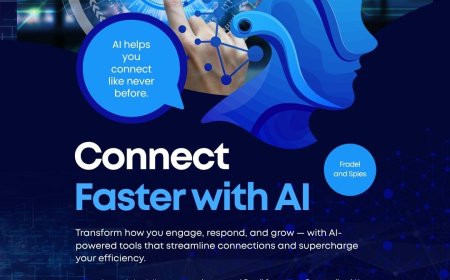The Quiet Revolution: How AI is Reshaping Our World
Artificial Intelligence (AI) is no longer a sci-fi fantasy; rather, it is a subtle but significant force that is changing almost every part of our lives. AI is at the center of a technological revolution that promises to revolutionize efficiency, innovation, and even our understanding of intelligence itself. Examples of this include the tailored suggestions on our streaming services and the complex algorithms that drive medical diagnosis
Artificial Intelligence (AI) is no longer a sci-fi fantasy; rather, it is a subtle but significant force that is changing almost every part of our lives. AI is at the center of a technological revolution that promises to revolutionize efficiency, innovation, and even our understanding of intelligence itself. Examples of this include the tailored suggestions on our streaming services and the complex algorithms that drive medical diagnosis.
What is artificial intelligence?
Fundamentally, artificial intelligence (AI) is the replication of human intelligence in machines that have been taught to think, learn, and solve problems. Numerous intriguing technologies are covered by this broad term. One important element is machine learning (ML), which allows computers to learn from data without the need for explicit programming. Consider how Netflix "learns" your taste in movies by looking at your past viewing habits. Your smartphone's facial recognition is made possible by deep learning (DL), a more sophisticated subset of machine learning (ML) that is inspired by the neural networks found in the human brain and allows for even more intricate pattern recognition. In addition to learning from data, artificial intelligence (AI) encompasses natural language processing (NLP), which enables computers to comprehend, interpret, and produce human language, allowing communication with voice assistants such as Siri or Alexa. Finally, computer vision enables machines to "see" and comprehend images and movies, which is essential for applications like manufacturing quality control and self-driving cars.
The Effect of AI on Various Industries
AI is already having a noticeable and revolutionary impact on many different industries.
AI is revolutionizing the healthcare industry. It helps in drug discovery, greatly speeding up the process of finding possible new drugs. It also plays a part in robotic surgery, improving accuracy and reducing invasiveness, and is essential for illness prediction by analyzing enormous volumes of patient data to find early warning indicators. As a result, diagnoses become more precise and treatments become more individualized.
Finance: AI is widely used in the financial sector to detect fraud and quickly spot questionable transactions. AI-powered risk assessment models offer deeper insights into market changes, resulting in more secure and effective transactions, while algorithmic trading leverages AI to execute trades at breakneck speed.
Transportation: The idea of autonomous vehicles is gradually moving from test models to a near-future reality, with the potential to transform urban mobility, lower accident rates, and improve logistics. AI is also used to manage intricate supply chains and optimize traffic flow.
Retail and E-commerce: Ever ponder how internet retailers appear to understand your specific preferences? That's artificial intelligence (AI) in action, enabling more effective inventory management, pricing strategy optimization, and personalized product suggestions. Chatbots also use AI to offer immediate client service.
Manufacturing: AI is essential to smart factories because it keeps an eye out for flaws in production lines, anticipates equipment problems before they occur, and streamlines procedures for optimal effectiveness, which results in better-quality products and less waste.
Daily Life: AI is simplifying and improving the intuitiveness of everyday chores even in our homes. Our living spaces are becoming more responsive and connected as a result of AI-powered smart assistants like Google Assistant and Amazon Alexa, which react to our orders, manage smart devices, and give information.
Managing the Future: Difficulties and Possibilities
But there are also significant issues and difficulties associated with the development of AI. Given that AI systems frequently rely on enormous datasets, ethical concerns around data privacy are crucial. Another serious issue is algorithmic bias; if the data used to train AI is biased, the AI may reinforce and even magnify those biases, producing unjust results. Another hotly debated issue is the possibility of job displacement in some industries, which calls for proactive workforce adaptation and retraining plans.
To fully utilize AI systems for good, they must be designed and implemented ethically, adhering to the tenets of accountability, transparency, and fairness. To deal with these complicated concerns, regulations and ethical frameworks are constantly being devised.
AI's capabilities will surely grow as it develops further, leading to opportunities we can only dream about. Even though the "quiet revolution" may not always be evident, its impact is indisputable, setting the path for a time when humans and machines will work together in more advanced and advantageous ways. Knowing artificial intelligence (AI), its possibilities, and its difficulties is becoming crucial for all citizens navigating our quickly evolving world.


































